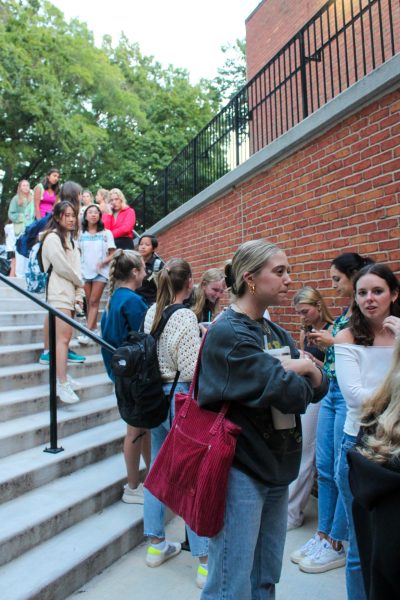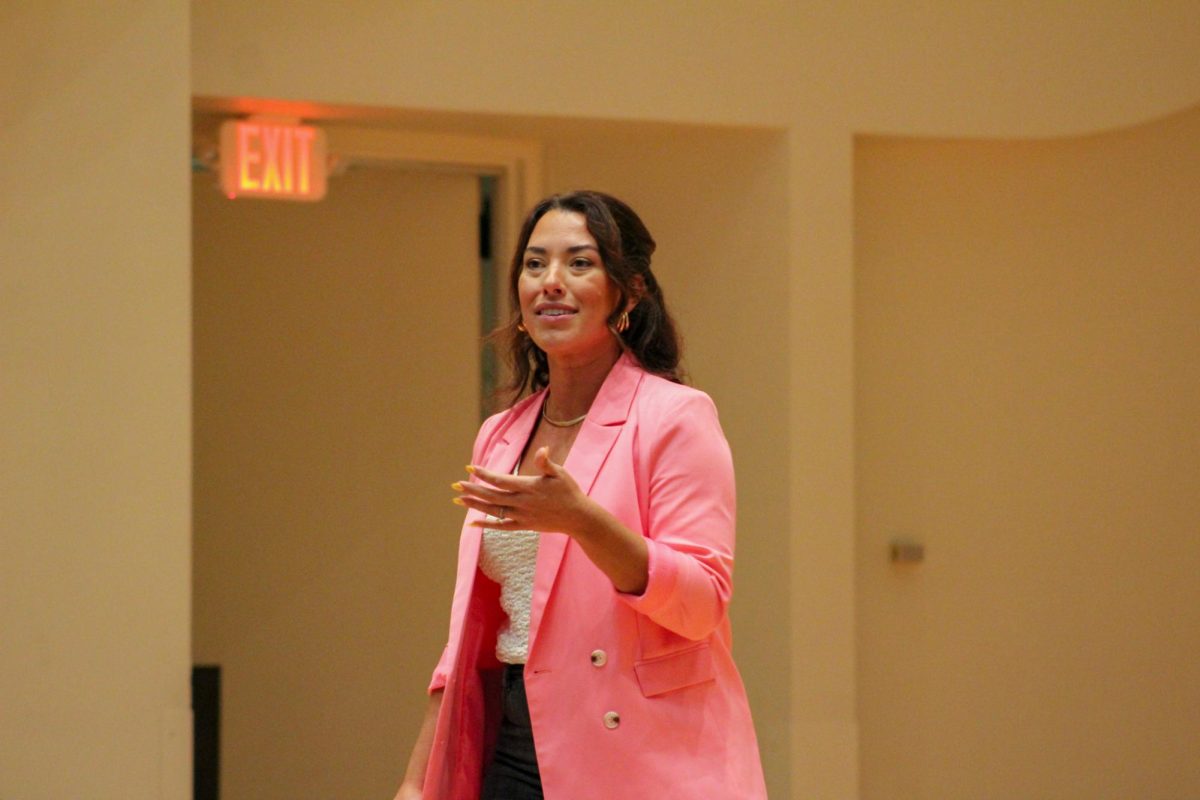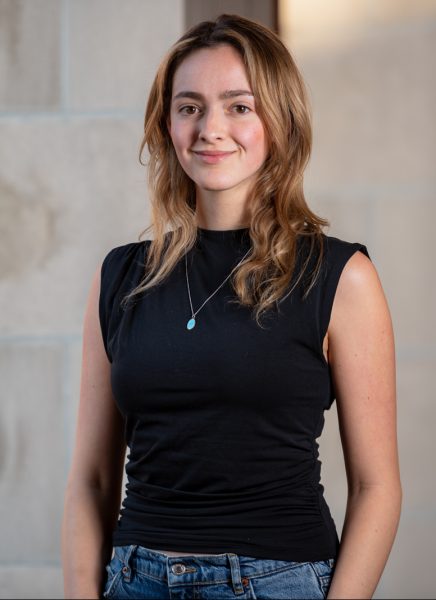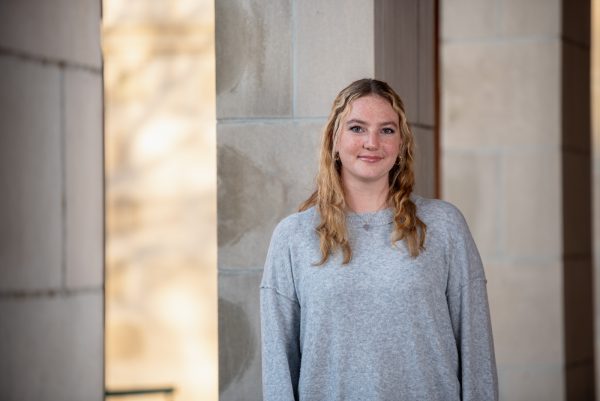Wake Forest’s Panhellenic Council hosted a mandatory lecture on Monday with sexual violence educator and speaker Bonny Shade. The event drew criticism from some Panhellenic members because of its mandatory nature, the lack of space for the event and the absence of Interfraternity Council (IFC) chapters.
“I need you to show up and care about this topic differently than you ever have before,” Shade said to the crowd of nearly 600 undergraduate women gathered in Brendle Recital Hall on Sept. 18. “I’ve heard some rumblings in the streets — why do we have to go to this? Where are the men? Can I be excused?”
According to her website, Shade “is changing the lives of student leaders and professionals through in-depth keynotes, workshops, custom curriculum and education.”
She has a leadership certificate in “Design Thinking,” a human-centered approach to problem solving. She has won multiple awards from inter/national organizations for her work with fraternity and sorority members and college students, focusing on holistic development.
During the event, Shade shared her own experience with sexual violence, statistics about high rates of violence in Greek Life, the spectrum of sexual violence and tangible ways to intervene.
Panhellenic Council President Sarah Haugh described the event as essential and empowering for women in Panhellenic chapters.
“I think we have an obligation to talk about the hard topics and to work to create a safe environment for everybody on campus,” Haugh said. “I think talking about it and understanding how we can better support each other as women, in the different spaces we choose to involve ourselves in, is really important.”
I think we have an obligation to talk about the hard topics and to work to create a safe environment for everybody on campus.
— Sarah Haugh, WFU Panhellenic President
In the 2023 Campus Climate Survey, commissioned by Wake Forest at the urging of Student Government to address concerns surrounding sexual misconduct, close to 70% of undergraduate women respondents reported experiencing sexual harassment — the highest rate of any group on campus.
Respondents also reported high levels of awareness of campus resources and high levels of prior training regarding sexual assault prevention through the survey.
Despite the fact that sorority members enjoyed the speaker, the event as a whole was met with backlash.
Some Panhellenic members voiced frustration with the mandatory attendance policy and excuse system. The only way to be excused from the event was to submit proof of a time conflict due to work or class, or to email their chapter’s president and CC Panhellenic Council’s Vice President of Accountability, Harriet Middleton, with explanation as to how the conversation would make you feel “unsafe.”
The Panhellenic Council promised confidentiality and emphasized the difference between feeling “uncomfortable” and feeling “unsafe” due to personal experience regarding the speaker’s content. Still, Panhellenic leaders expressed that members of the audience were free to leave the event at any point if they felt “unsafe.”
When the mandatory requirement was met with backlash from members of sororities across campus — concerned with confidentiality and sensitivity — Panhellenic Council and chapters clarified that members did not have to share any details in their emails other than that they felt “unsafe.”
“Even if it was after the deadline, every single person that submitted an excuse that said they were unsafe [was] excused,” Middleton said. “No exceptions to that.”

Additionally, roughly 200 members of Panhellenic chapters ended up being excused due to a lack of seats in Brendle Recital Hall. Members who were part of the overflow had their student I.D.s scanned and were marked as present, then excused to leave.
“I was embarrassed by the way the event was planned and executed. I felt that the lack of planning toward such an important topic was inexcusable and took away from the messaging,” said the president of a Panhellenic chapter, who the Old Gold & Black granted anonymity due to concern of possible repercussions from the Panhellenic Council.
In addition to the attendance policy, another source of criticism came from the fact that members of the IFC chapters were not required to attend the Shade discussion and had not planned a comparable event of their own. This sparked controversy among sorority members — who make up the majority of undergraduate women.
“I think that Bonny was a great speaker and it was a valuable experience,” attendee Anna Wexler said. “However, I can’t help but wonder why we are still discussing ways for women to avoid being assaulted rather than trying to modify the behavior of the male perpetrators of sexual assault.”
Other members from different chapters echoed this grievance.
“There needs to be a conversation on both sides about consent,” Panhellenic member Alyssa Eaton said. “Not just one or the other.”
Haugh agreed with this sentiment, but further explained that Shade’s event was specifically tailored to show women how to support other women. Haugh asserted that having men in the audience would change the atmosphere in a negative way.
“If you have 300 men sitting in the back of the room, you don’t know who they are, you don’t know what their thoughts are,” Haugh said. “It’s a community that you’re not involved in — and all of a sudden, it makes the conversation feel very different.”
Haugh expressed how Panhellenic Council’s identity as a community comprised entirely of women lends itself to prioritizing events directed at sexual assault prevention.
“[Panhellenic Council] is in a slightly different boat [than IFC], because in many ways, it’s been happening to us,” Haugh said, “I think that invites a different response in terms of how a community sees it, if that makes sense.”
IFC offered assurance that the issue of sexual violence was of their utmost concern, as well. In an email to the Old Gold & Black, IFC President Emory Horton wrote that “sexual conduct and men’s mental health at Wake are the two most pressing and pertinent priorities of IFC currently.”
Horton also said that IFC has planned two events for IFC Week, Oct. 29-Nov. 4, that directly cover issues associated with consent and sexual assault. He reiterated the need for culture changes within the Wake Forest community.
“Our approach to the issue of sexual misconduct is a response to the current campus climate; female members of our community often don’t feel comfortable in social situations,” Horton told the Old Gold & Black. “We decided to create intentional educational programming this fall to challenge this culture.”
When asked by the Old Gold & Black about IFC’s involvement in the Sept. 18 event, Shade reaffirmed Panhellenic Council’s decision.
If men want to have this type of conversation, they can plan it.
— Bonny Shade
“I think this is powerful that the Panhellenic Executive Board set this event up specifically for women because they didn’t want to have to worry about planning it for the men,” Shade said. “If men want to have this type of conversation, they can plan it. This conversation specifically was just for women for those reasons.”
Shade said she would be willing to return to campus and speak again to Panhellenic Council, IFC or both organizations as long as her message gets across in a positive manner. When asked about having a joint conversation in the future, Haugh remained optimistic but stated her belief that there’s still a plethora of separate work to be done.
“I definitely think it would be beneficial to open up that conversation with IFC, to encourage a more honest communication between both councils,” Haugh said. “I think both of us as councils have to start having those honest conversations with ourselves before we can get to a place where it makes sense to have that with each other.”
















